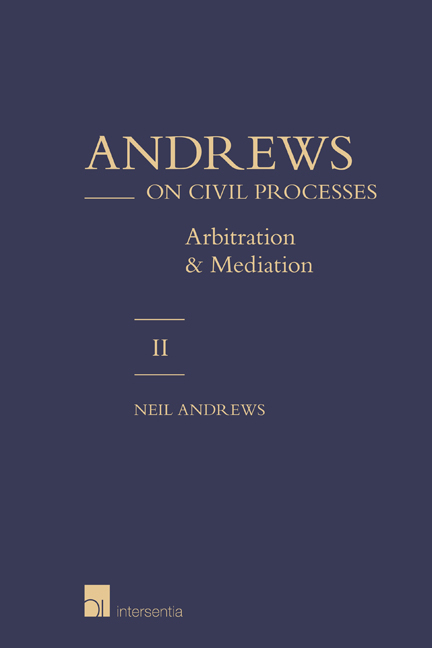Book contents
- Frontmatter
- Dedication
- CONTENTS VOLUME I
- Contents
- Table of Cases
- Table of Statutes
- Table of Statutory Instruments
- PART I MEDIATION
- PART II ARBITRATION
- Chapter 3 Commercial Arbitration: What Is It and Why Choose It?
- Chapter 4 The Major Principles of Arbitration and Litigation: A Comparison
- Chapter 5 Fundamental Features of English Arbitration
- Chapter 6 ‘The Seat’ and the Range of Relevant Laws
- Chapter 7 ‘Arbitrability’: Public Policy Limitations upon the Scope of Arbitration
- Chapter 8 A Confidential Process
- Chapter 9 Arbitration Agreements
- Chapter 10 Courts Giving Effect to Arbitration Agreements
- Chapter 11 Commencement of the Submission and Time Issues
- Chapter 12 The Tribunal's Appointment, Tenure and Immunity
- Chapter 13 Pre-Hearing Proceedings
- Chapter 14 The Hearing
- Chapter 15 Final Remedies, the Award, and Correction of the Award by the Tribunal
- Chapter 16 Fees, Expenses and Recoverable Costs
- Chapter 17 Arbitration Awards: Issues of Finality and Res Judicata
- Chapter 18 Challenges to English Arbitral Awards under English Law
- Chapter 19 English Enforcement of English Awards
- Chapter 20 Enforcement under the New York Convention (1958)
- PART III CONSUMER ADR
- Select Bibliography
- Index to Volumes I and II
Chapter 8 - A Confidential Process
from PART II - ARBITRATION
Published online by Cambridge University Press: 13 December 2017
- Frontmatter
- Dedication
- CONTENTS VOLUME I
- Contents
- Table of Cases
- Table of Statutes
- Table of Statutory Instruments
- PART I MEDIATION
- PART II ARBITRATION
- Chapter 3 Commercial Arbitration: What Is It and Why Choose It?
- Chapter 4 The Major Principles of Arbitration and Litigation: A Comparison
- Chapter 5 Fundamental Features of English Arbitration
- Chapter 6 ‘The Seat’ and the Range of Relevant Laws
- Chapter 7 ‘Arbitrability’: Public Policy Limitations upon the Scope of Arbitration
- Chapter 8 A Confidential Process
- Chapter 9 Arbitration Agreements
- Chapter 10 Courts Giving Effect to Arbitration Agreements
- Chapter 11 Commencement of the Submission and Time Issues
- Chapter 12 The Tribunal's Appointment, Tenure and Immunity
- Chapter 13 Pre-Hearing Proceedings
- Chapter 14 The Hearing
- Chapter 15 Final Remedies, the Award, and Correction of the Award by the Tribunal
- Chapter 16 Fees, Expenses and Recoverable Costs
- Chapter 17 Arbitration Awards: Issues of Finality and Res Judicata
- Chapter 18 Challenges to English Arbitral Awards under English Law
- Chapter 19 English Enforcement of English Awards
- Chapter 20 Enforcement under the New York Convention (1958)
- PART III CONSUMER ADR
- Select Bibliography
- Index to Volumes I and II
Summary
INTRODUCTION
ABSENCE OF ENGLISH LEGISLATION ON CONFIDENTIALITY
This topic was not covered by the Arbitration Act 1996 (England and Wales) because the Departmental Advisory Committee (1996) regarded the subject as too fluid for consolidation. That report stated that recognition of exceptions to confidentiality would need to be worked out by the courts on a case-by-case basis. As we shall see, there is no clearly delineated set of exceptions. This topic continues to be molten. Indeed, the exceptions have been described as ‘manifestly legion and unsettled in part’.
COMPARATIVE SOURCES
The judgments in Emmott v. Michael Wilson & Partners Ltd (2008) contain rich citation of the English case law, and foreign courts’ decisions, as well as the relevant rules adopted by leading arbitration bodies8 on the question of ‘privacy of hearings–9 ‘confidentiality of documentation’, ‘confidentiality of awards’, and literature discussing these rules.
Since the Michael Wilson case (2008), there has been some development of this topic in Scotland: an important judicial decision (Gray Construction Limited v. Harley Haddow LLP (2012), on which 8.20 ff below), and legislation (the Arbitration (Scotland) Act 2010), containing a codification of the whole topic. Of course, Scots law remains separate from English law, so that these Scottish materials are merely of comparative interest. Nevertheless, the analysis of various exceptions to confidentiality is attractive, and the pre-2010 Act decision in Gray Construction Limited v. Harley Haddow LLP (2012) is a convincing illustration.
As the (English) Departmental Advisory Committee (1996) noted, Australian decisions have been perceived in England as troublingly ungenerous in their protection of arbitral confidentiality: England and Australia have here parted company.
IMPLIED TERM ANALYSIS
The (English) Court of Appeal's decision in Emmott v. Michael Wilson & Partners Ltd (2008) confirms that an obligation of confidentiality arises as a matter of law (on the basis of an ‘implied term in law’) in arbitration references conducted in accordance with English law. This implied term has been recognised for some time. For example, the Court of Appeal in Ali Shipping Corporation v. Shipyard Trogir (1999) had said that this term is ‘an essential corollary of the privacy of arbitration proceedings’. (For a Scottish decision adopting the same analysis, see Gray Construction Limited v. Harley Haddow LLP (2012), on which 8.20 ff below).
- Type
- Chapter
- Information
- Andrews on Civil ProcessesArbitration and Mediation, pp. 179 - 194Publisher: IntersentiaPrint publication year: 2013



